Death Certificate may refer to:
- Death certificate, a document concerning a person's death
- Death Certificate (album), an album by rapper Ice Cube
- "Death Certificate for a Beauty Queen", a single by metal band I Killed the Prom Queen
Death Certificate may refer to:
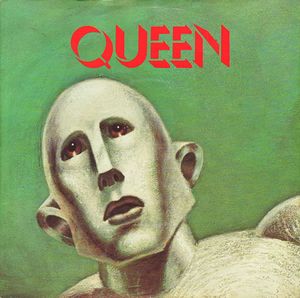
"We Are the Champions" is a song by the British rock band Queen, released from the band's sixth album News of the World (1977). Written by lead singer Freddie Mercury, it remains among rock's most recognisable anthems. The song was a worldwide success, reaching number two in the UK, number four on the Billboard Hot 100 in the US, number three in Canada, and the top ten in many other countries. In 2009 it was inducted into the Grammy Hall of Fame and was voted the world's favourite song in a 2005 Sony Ericsson world music poll.

"Crazy Little Thing Called Love" is a song by the British rock band Queen. Written by Freddie Mercury in 1979, the track is included on their 1980 album The Game, and also appears on the band's compilation album Greatest Hits in 1981. The song peaked at number two in the UK Singles Chart in 1979 and became the group's first number-one single on the Billboard Hot 100 in the US in 1980, remaining there for four consecutive weeks. It topped the Australian ARIA Charts for seven weeks. It was the band's final single release of the 1970s.

"We Will Rock You" is a song by the British rock band Queen for their 1977 album News of the World, written by guitarist Brian May. Rolling Stone ranked it number 330 of "The 500 Greatest Songs of All Time" in 2004, and it placed at number 146 on the Songs of the Century list in 2001. In 2009, "We Will Rock You" was inducted into the Grammy Hall of Fame.
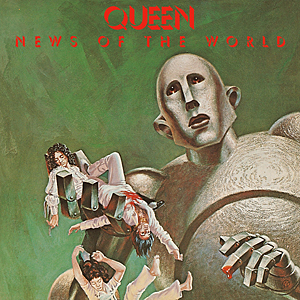
News of the World is the sixth studio album by the British rock band Queen, released on 28 October 1977 by EMI Records in the United Kingdom and by Elektra Records in the United States. News of the World was the band's second album to be recorded at Sarm and Wessex Sound Studios in London, and engineered by Mike Stone, and was co-produced by the band and Stone.

A Night at the Opera is the fourth studio album by the British rock band Queen, released on 21 November 1975 by EMI Records in the United Kingdom and Elektra Records in the United States. Produced by Roy Thomas Baker and Queen, it was reportedly the most expensive album ever recorded at the time of its release.

Innuendo is the fourteenth studio album by the British rock band Queen, released on 4 February 1991 by Parlophone in the United Kingdom and it is the band's first studio album to be released by Hollywood Records in the United States. Produced by David Richards and the band, it was the band's last album to be released in lead singer Freddie Mercury's lifetime, and their most recent one to be composed of entirely new material, save for The Cosmos Rocks by the Queen + Paul Rodgers collaboration. It reached the No. 1 spot on the UK album charts for two weeks, and also peaked at No. 1 in Italy, the Netherlands, Germany, and Switzerland, staying at No. 1 for three weeks, four weeks, six weeks, and eight weeks, respectively. It was the first Queen album to go Gold in the US upon its release since The Works in 1984.

Made in Heaven is the fifteenth and final studio album by the British rock band Queen, released on 6 November 1995 by Parlophone Records in the United Kingdom and by Hollywood Records in the United States. It was the band's first and only album released solely under the name "Queen" after the death of lead singer Freddie Mercury in 1991. Following Mercury's death, guitarist Brian May, drummer Roger Taylor, and bass guitarist John Deacon worked with vocal and piano parts that Mercury recorded before his death, adding new instrumentation to the recordings. Both stages of recording, before and after Mercury's death, were completed at the band's studio in Montreux, Switzerland. The album debuted at number 1 in the UK, where it went quadruple platinum selling 1.2 million copies. 500,000 copies were shipped in the United States.

Classic Queen is a 1992 compilation album by the British rock band Queen. The album was seen as a US version of Greatest Hits II and was issued to capitalize on the renewed popularity of Queen in the United States following the release of the movie Wayne's World and the death of Freddie Mercury. The album reached number four on the US Billboard 200 and was certified three times platinum in the US and five times platinum in Canada. Accumulated sales are in excess of 25 million worldwide.

Greatest Hits is a compilation album by the British rock band Queen, released worldwide on 26 October 1981. The album consisted of Queen's biggest hits since their first chart appearance in 1974 with "Seven Seas of Rhye", up to their 1980 hit "Flash". There was no universal track listing or cover art for the album, and each territory's tracks were dependent on what singles had been released there and which were successful. In 1992, the US version of the album Classic Queen was released following the band's rekindled popularity in the nation.

"I Was Born to Love You" is a 1985 song by Freddie Mercury that was released as a single from his first solo album, Mr. Bad Guy. After Mercury's death, Queen re-worked this song for their album Made in Heaven in 1995, by having the other members play their instrumental parts over the original track, transforming the song from disco to rock. The Queen version from the Made in Heaven album also includes snippets of Mercury's ad-lib vocals taken from "A Kind of Magic" and from "Living on My Own".

"Don't Stop Me Now" is a song by the British rock band Queen, featured on their 1978 album Jazz and released as a single on 26 January 1979. Written by lead singer Freddie Mercury, it was recorded in August 1978 at Super Bear Studios in Berre-les-Alpes (Alpes-Maritimes), France, and is the twelfth track on the album.

"These Are the Days of Our Lives" is a song by the British rock band Queen. Although credited to the whole band, it was largely written by their drummer Roger Taylor, and is the eighth track on the band's 1991 album Innuendo.
"Love of My Life" is a song by the British rock band Queen from their 1975 album A Night at the Opera. The song is a sentimental ballad, notably featuring a harp played by Brian May.
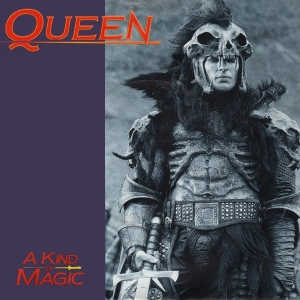
"A Kind of Magic" is the title track of the 1986 album of the same name by the British rock band Queen. It was written by the band's drummer, Roger Taylor, for the film Highlander and featured as the ending theme. The single reached number three in the UK Singles Chart, top ten in a number of European countries, and #42 on the US Billboard Hot 100. The song is the opening track on the band's compilation albums, Greatest Hits II, and Classic Queen.

Queen on Fire – Live at the Bowl is a DVD/live album by the British rock band Queen released on 25 October 2004 in Europe and on 9 November 2004 in the US. It was recorded live at the Milton Keynes Bowl, Buckinghamshire, England, on 5 June 1982 during the Hot Space Tour. A DVD was also released with the complete concert and bonus material, such as band interviews and tour highlights.
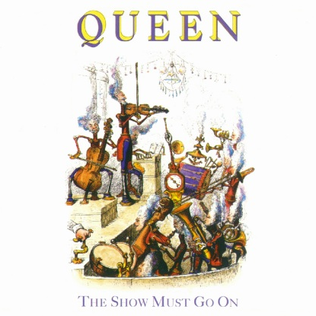
"The Show Must Go On" is a song by British rock band Queen, featured as the twelfth and final track on their 1991 album, Innuendo. It is credited to Queen, but written mainly by Brian May. The song chronicles the effort of frontman Freddie Mercury continuing to perform despite approaching the end of his life, although his diagnosis with HIV/AIDS had not yet been made public in spite of ongoing media speculation claiming that he was seriously ill. When the band recorded the song in 1990, Mercury's condition had deteriorated to the point that May had concerns as to whether he was physically capable of singing it. May recalls; "I said, 'Fred, I don't know if this is going to be possible to sing.' And he went, 'I'll fucking do it, darling'—vodka down—and went in and killed it, completely lacerated that vocal".

"Too Much Love Will Kill You" is a song written by British guitarist Brian May of Queen, Frank Musker and Elizabeth Lamers. The song reflected the breakdown of May's first marriage and attraction to his future wife, Anita Dobson. It was first recorded by Queen around 1988 or before, and was intended to be on the band's The Miracle album in 1989, but did not make the cut due to legal disputes following the band's decision that all songs on the album would be written by the group as opposed to individuals.

British rock band Queen have released 15 studio albums, 10 live albums, 16 compilation albums, 2 soundtrack albums, 2 extended plays, 73 singles, and 7 promotional singles. Queen was formed in London by Freddie Mercury, Brian May (guitar), and Roger Taylor (drums), and in 1971, John Deacon (bassist) became a member.

This is the complete discography of the Canadian rock band Sum 41. The band has released eight studio albums, three live albums, one compilation album, five video albums, 32 music videos, two EPs, 23 singles, nine B-sides, nine promotional singles, and one demo album.
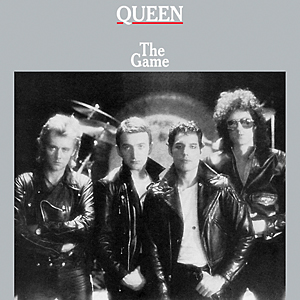
The Game is the eighth studio album by the British rock band Queen. It was released on 30 June 1980 by EMI Records in the UK and by Elektra Records in the US. The Game features a different sound from its predecessor, Jazz (1978). The Game was the first Queen album to use a synthesizer.